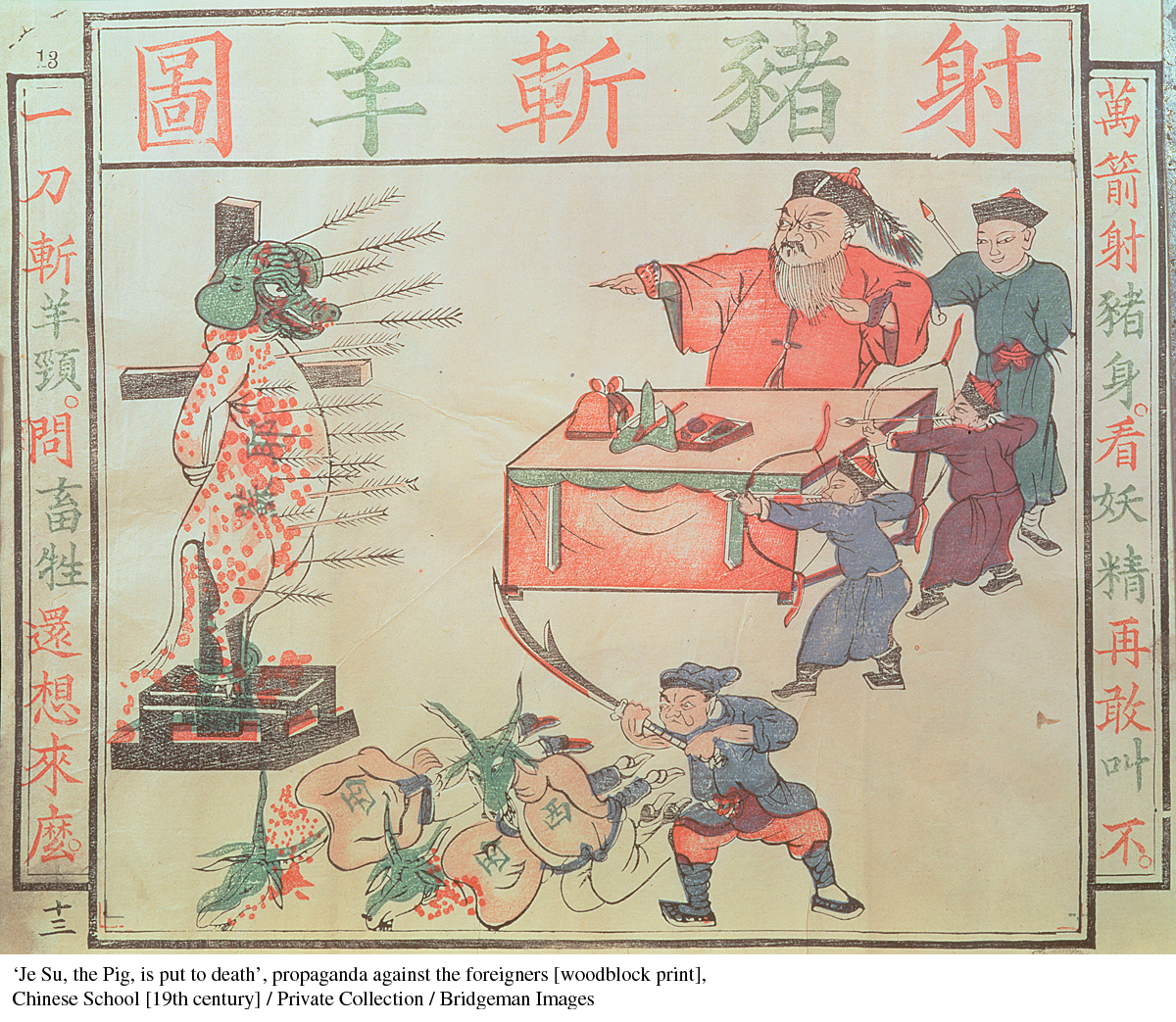Growing Resistance to Colonial Domination
Growing Resistance to Colonial Domination
Japanese military victories over the Qing in China and the Romanovs in Russia upset the status quo in both countries and encouraged nationalist protests across the globe, further setting the West on edge. Uprisings began in China after the 1895 defeat by Japan. Nonhuman factors also affected the Chinese people as drought and famine came to plague the empire. Despairing peasants organized into secret societies to expel the foreigners and restore Chinese dignity and power. One organization was the Society of the Righteous and Harmonious Fists, commonly called the Boxers, whose members maintained that ritual boxing would protect them from a variety of evils, including bullets. Encouraged by the Qing ruler, the dowager empress Tz’u-hsi (Cixi; 1835–1908), the Boxers rebelled in 1900, massacring the missionaries and Chinese Christians to whom they attributed China’s troubles. Seven of the colonial powers united to put down the Boxer Uprising and to devastate the areas in which the Boxers operated. Defeated once more, the Chinese had to pay a huge indemnity and allow even greater foreign military occupation.
The Boxer Uprising thoroughly discredited the Qing dynasty, leading a group of revolutionaries to overthrow the dynasty in 1911 and to declare China a republic the next year. Their leader, Sun Yat-sen (1866–1925), who had been educated in Hawaii and Japan, combined Western ideas and Chinese values in his Three Principles of the People: “nationalism, democracy, and socialism.” For example, Sun’s socialism included the Chinese belief that all people should have enough food, and his Nationalist Party called for revival of the Chinese tradition of correctness in behavior between governors and the governed, modern economic reform, and an end to Western domination of trade. Sun’s stirring leadership and the changes brought about by the 1911 revolution helped weaken Western imperialism.
In India, the Japanese victory over Russia and the Revolution of 1905 stimulated politicians to take a more radical course than that offered by the Indian National Congress. The anti-British Hindu leader B. G. Tilak, less moderate than Congress reformers, urged noncooperation: “We shall not give them assistance to collect revenue and keep peace. We shall not assist them in fighting beyond the frontiers or outside India with Indian blood and money.” Tilak asserted the distinctiveness of Hindu values from British ways and urged outright rebellion against the British. This brand of nationalism contrasted with that based on assimilating to British culture and promoting gradual change. Trying to stop Tilak, the British sponsored a rival nationalist group, the Muslim League, in a blatant attempt to divide Muslims from Hindus in the Congress. Faced with political activism, Britain conceded to Indians’ representation in ruling councils and their right to vote based on property ownership. But discontent also mounted, sometimes silently, as did worries among the most clear-sighted imperialists about the future.

Revolutionary nationalism was simultaneously weakening the Ottoman Empire, which for centuries had controlled much of the Mediterranean. Rebellions plagued Ottoman rule, and this resistance allowed European influence to grow even as Ottoman reformers aimed to strengthen the government. Sultan Abdul Hamid II (r. 1876–1909) tried to revitalize the multiethnic empire by using Islam to counteract the rising nationalism of the Serbs, Bulgarians, and Macedonians. Instead, he unintentionally provoked Turkish nationalism, which built on the uniqueness of the Turks’ culture, history, and language, as many European ethnic groups were also doing. (See “Document 24.2: A Turkish Poem.”) The Japanese defeat of Russia in 1904–1905 electrified these nationalists with the vision of a modern Turkey becoming “the Japan of the Middle East,” as they called it. In 1908, a group of nationalists called the Young Turks took control of the government in Constantinople. The Young Turks’ triumph motivated other ethnic groups in the Middle East and the Balkans to demand an end to Ottoman domination in their regions. Strong contingents of feminist-nationalists mobilized women to work for independence. However, the Young Turks, often aided by European powers with financial interests in the region, brutally repressed nationalist uprisings in Egypt, Syria, and the Balkans that their own success had encouraged.
REVIEW QUESTION How and why did events in overseas empires from the 1890s on challenge Western faith in imperialism?
The rebellions were part of the turmoil in global relations during the years just before World War I, as empires became the scene of growing opposition in the wake of Japanese, Russian, and Turkish events. In German East Africa, colonial forces responded to native resistance in 1905 with a scorched-earth policy, eventually killing more than 100,000 Africans there. To maintain their grip on Indochina, the French closed the University of Hanoi, executed Indochinese intellectuals, and deported thousands of suspected nationalists. A French general stationed there summed up the fears of many colonial rulers: “The gravest fact of our actual political situation in Indochina is not the recent trouble in Tonkin [or] the plots undertaken against us but in the muted but growing hatred that our subjects show toward us.” (See “Document 24.3: Vietnamese Resistance and the Importance of Becoming Modern.”)